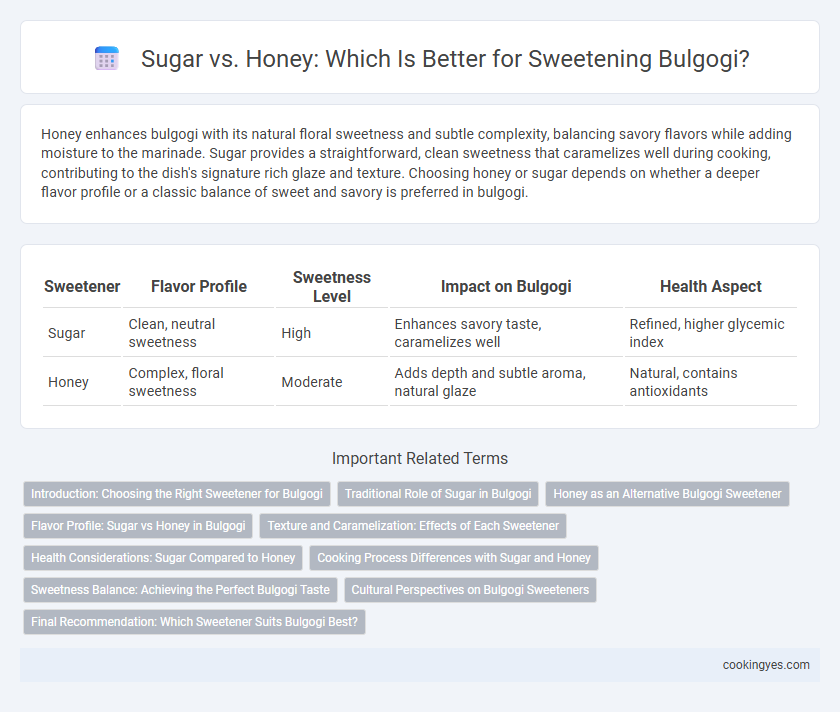Honey enhances bulgogi with its natural floral sweetness and subtle complexity, balancing savory flavors while adding moisture to the marinade. Sugar provides a straightforward, clean sweetness that caramelizes well during cooking, contributing to the dish's signature rich glaze and texture. Choosing honey or sugar depends on whether a deeper flavor profile or a classic balance of sweet and savory is preferred in bulgogi.
Table of Comparison
| Sweetener | Flavor Profile | Sweetness Level | Impact on Bulgogi | Health Aspect |
|---|---|---|---|---|
| Sugar | Clean, neutral sweetness | High | Enhances savory taste, caramelizes well | Refined, higher glycemic index |
| Honey | Complex, floral sweetness | Moderate | Adds depth and subtle aroma, natural glaze | Natural, contains antioxidants |
Introduction: Choosing the Right Sweetener for Bulgogi
Selecting the optimal sweetener for bulgogi balancing flavor and authenticity is essential. Sugar provides a clean, straightforward sweetness that enhances the savory marinade without overpowering other ingredients. Honey introduces a complex, floral undertone along with moisture retention, enriching the marinade's depth and tenderness in the grilled bulgogi.
Traditional Role of Sugar in Bulgogi
Sugar traditionally serves as the primary sweetening agent in bulgogi, providing a balanced caramelization and enhancing the marinade's savory depth. Its fine granules dissolve evenly, allowing for consistent flavor absorption throughout the beef, which contributes to the dish's characteristic tender texture. While honey offers a natural alternative, sugar's neutral sweetness preserves the authentic taste profile essential to classic bulgogi recipes.
Honey as an Alternative Bulgogi Sweetener
Honey serves as a natural alternative sweetener in bulgogi, providing a rich, floral sweetness that enhances the marinade's depth of flavor. Unlike sugar, honey contains trace enzymes and antioxidants that contribute subtle complexity and moisture retention, resulting in tender, juicy meat. Its lower glycemic index also makes honey a healthier option without compromising the traditional balance of sweet and savory in bulgogi recipes.
Flavor Profile: Sugar vs Honey in Bulgogi
Sugar provides a clean, straightforward sweetness that enhances the savory notes of bulgogi without altering its original flavor profile. Honey adds a complex, floral sweetness and a subtle depth, introducing mild fruity and caramel undertones that complement the marinade's soy and garlic base. Choosing honey results in a richer, more layered taste experience, while sugar maintains a balanced, crisp finish.
Texture and Caramelization: Effects of Each Sweetener
Honey enhances Bulgogi's texture by adding a subtle moisture that prevents dryness during cooking, resulting in a tender, juicy bite. Its natural sugars promote deeper caramelization, producing a rich, complex glaze with a slightly sticky finish. In contrast, granulated sugar tends to create a crisper crust due to rapid caramelization but may dry out the meat, lacking the moist softness that honey imparts.
Health Considerations: Sugar Compared to Honey
Honey offers antioxidants and vitamins absent in refined sugar, making it a nutritionally richer sweetener for bulgogi marinades. While sugar provides a straightforward, clean sweetness, honey's natural enzymes may aid digestion and provide a gentler glycemic impact. Using honey instead of sugar can reduce spikes in blood glucose levels, supporting better overall metabolic health.
Cooking Process Differences with Sugar and Honey
Sugar caramelizes more quickly during the bulgogi cooking process, creating a deeper, slightly crisp texture on the meat's surface, while honey melts slowly, imparting a moist glaze and subtle floral sweetness. With sugar, the marinade develops a more pronounced caramelized flavor as it cooks at high heat, whereas honey's natural enzymes help tenderize the meat gently without burning as fast. Honey also causes the bulgogi to brown evenly due to its higher moisture content, making it ideal for slower grilling or pan-frying methods.
Sweetness Balance: Achieving the Perfect Bulgogi Taste
Honey provides a natural sweetness that enhances bulgogi's rich flavors with subtle floral notes, creating a smooth sweetness balance. Sugar offers a straightforward, sharper sweetness that can quickly caramelize, adding depth and a slightly crisp texture to the marinade. Combining both honey and sugar allows for a more nuanced bulgogi taste, balancing sweetness with complexity and preserving the dish's signature umami profile.
Cultural Perspectives on Bulgogi Sweeteners
Traditional Korean bulgogi recipes often favor honey as a natural sweetener, reflecting cultural preferences for subtle, floral sweetness that complements the marinated beef. While sugar is widely used in modern cooking for its affordability and straightforward sweetness, honey remains esteemed for its ability to balance flavors and enhance the umami profile in bulgogi. This cultural distinction highlights how ingredient choices influence not only taste but also the authenticity and heritage of Korean cuisine.
Final Recommendation: Which Sweetener Suits Bulgogi Best?
Honey enhances bulgogi with a richer, more complex sweetness and subtle floral notes, while sugar provides a cleaner, more straightforward sweetness that caramelizes evenly during cooking. For achieving a traditional, authentic bulgogi flavor, honey's moisture retention and mild acidity help tenderize the meat and balance the savory marinade effectively. Therefore, honey is recommended as the superior sweetener for bulgogi, offering better flavor depth and texture in the final dish.
Sugar vs honey for bulgogi sweetness Infographic

 cookingyes.com
cookingyes.com